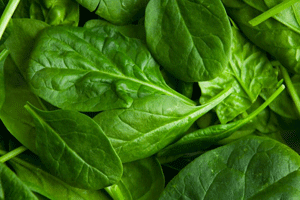
Organic facts weighs in on the health benefits of spinach

The health benefits of spinach include skin care, improved eyesight, regulated blood pressure, stronger muscles, and prevention of age-related macular degeneration (AMD) and hemophilia. It is also good for treating cataracts, atherosclerosis, heart attacks, and neurological disorders. It helps in bone mineralization and exerts anti-ulcerative and anti-cancerous benefits. Aside from all this, it aids in the healthy fetal development and growth of infants
Crustless Spinach Cheese Pie

What is Spinach?
Spinach (Spinacia oleracea) is one of the most popular green, leafy vegetables in the world as it is a rich source of minerals, vitamins, pigments, and phytonutrients. It is a member of the Amaranthaceae family Due to the vast range of benefits from this vegetable, it is advisable to consume spinach on a regular basis. [1] One of the biggest reasons why these greens are so important and valued around the world is that they are very durable. It can even survive through the winter and be just as healthy in the spring.
Check out this EZ Breezy Cheezy Crustless Spinach Pie Recipe
Spinach can be eaten raw as a part of many salads, and it can also be cooked or sauteed down into a reduced form. This can be eaten as a side dish vegetable or added in a number of recipes for soups, stews, and casseroles. It is native to the Middle East and was cultivated in Persia thousands of years ago. From there, it was brought into China, approximately 1,500 years ago. It made its way into Europe a few hundred years later and quickly became a staple in a number of cultural cuisines.
Spinach is a rich source of minerals, vitamins, pigments, and nutrients.
Nutrition Facts: Spinach, raw
Serving Size:
Nutrient Value
- Water [g]: 91.4
- Energy [kcal]: 23
- Protein [g]: 2.86
- Total lipid (fat) [g]: 0.39
- Carbohydrate, by difference [g]: 3.63
- Fiber, total dietary [g]: 2.2
- Sugars, total [g]: 0.42
- Calcium, Ca [mg]: 99
- Iron, Fe [mg]: 2.71
- Magnesium, Mg [mg]: 79
- Phosphorus, P [mg]: 49
- Potassium, K [mg]: 558
- Sodium, Na [mg]: 79
- Zinc, Zn [mg]: 0.53
- Vitamin C, total ascorbic acid [mg]: 28.1
- Thiamin [mg]: 0.08
- Riboflavin [mg]: 0.19
- Niacin [mg]: 0.72
- Vitamin B-6 [mg]: 0.2
- Folate, DFE [µg]: 194
- Vitamin B-12 [µg]: 0
- Vitamin A, RAE [µg]: 469
- Vitamin A, IU [IU]: 9377
- Vitamin E (alpha-tocopherol) [mg]: 2.03
- Vitamin D (D2 + D3) [µg]: 0
- Vitamin D [IU]: 0
- Vitamin K (phylloquinone) [µg]: 482.9
- Fatty acids, total saturated [g]: 0.06
- Fatty acids, total monounsaturated [g]: 0.01
- Fatty acids, total polyunsaturated [g]: 0.17
- Fatty acids, total trans [g]: 0
- Cholesterol [mg]: 0
- Caffeine [mg]: 0
- Sources include: USDA [2]
Spinach Nutrition Facts
The various health benefits of spinach are due to the presence of minerals, vitamins, pigments, and phytonutrients, including potassium, zinc, magnesium, iron, and calcium. According to USDA National Nutrient Database, the green leafy vegetable is a source of vitamins like folate, niacin, vitamin A, vitamin B6, vitamin C, vitamin K, and contains traces of the rest of the essential vitamins. [3] Other important elements, including thiamine and riboflavin, which are used in various reactions in our body, are also found in this green, leafy vegetable. The best part is that spinach has low-fat content.
Health Benefits of Spinach
Spinach has many important roles to play in maintaining a healthy body; the various health benefits include the following:
Improves Eyesight
Helen M Rasmussen, a researcher at the Cambridge University, in her 2013 report published in the Clinical Interventions in Aging revealed that spinach is a rich source of beta-carotene, lutein, and xanthene, all of which are beneficial for eyesight. [4] Beta-carotene, in cooked spinach, helps boost eye health. It can also prevent vitamin A deficiencies, itching eyes, eye ulcers, and dry eyes. The anti-inflammatory properties of these greens can also reduce the puffiness or irritation in the eyes.
Treats Macular Degeneration
AMD or Retinitis pigmentosa is responsible for causing blindness, which is due to the degeneration of lutein and xanthene that are a central part of the retina. In a paper [5] titled, ‘Age‐related macular degeneration and recent developments’, published in the Post Graduate Medical Journal, it was revealed that patients with AMD, must consume fresh green leafy vegetables, especially spinach since it contains carotenoids. It also contains a wealth of antioxidants that reduce the harmful effects of free radicals, which are known to negatively impact vision and cause age-related conditions like glaucoma and macular degeneration as well.
Provides Neurological Benefits
Fernando Gómez-Pinilla, a researcher at the Department of Neurosurgery and Physiological Science, University of California, US, suggests that spinach with a high anti-oxidant capacity has been associated with the mitochondrial activity, responsible to influence cognitive function. [6] Several components of this vegetable like potassium, folate, and various antioxidants are known to provide neurological benefits to people who regularly consume it. Folate reduces the occurrence of Alzheimer’s disease, so spinach is a very good idea for people who are at high risk of neural or cognitive decline. [7] Potassium is an integral part of brain health as well, and it has been linked to increased blood flow to the brain and heightened cognition, concentration, and neural activity.
Treats Hemophilia
Vitamin K-rich spinach helps in blood clotting by producing prothrombin and it thus treats hemophilia. It is great for controlling excessive bleeding and it also keeps the liver functioning by stimulating the production of glycogen.
Maintains Blood Pressure
Spinach has a very high content of potassium and a low content of sodium. This composition of minerals is very beneficial for high blood pressure patients as potassium lowers and sodium raises the blood pressure. Folate present in spinach also contributes to the reduction of hypertension and relaxes blood vessels, while maintaining proper blood flow. [8] By reducing blood pressure and relaxing the tension of vessels and arteries, you can reduce stress on the cardiovascular system and increase oxygenation to the body’s organ systems for optimal functionality.
Strengthens Muscles
Factor C0-Q10, which is an antioxidant present in spinach, plays an important role in strengthening muscles, especially heart muscles which continuously pump blood to all parts of the body. C0-Q10 can be used to prevent and treat many cardiovascular diseases like hyperlipidemia, heart failure, hypertension, and coronary heart disease. [9]
Helps in Bone Mineralization
Spinach is a good source of Vitamin K, which functions in retaining calcium in the bone matrix, thereby leading to bone mineralization. [10] Apart from this, other minerals like manganese, copper, magnesium, zinc, and phosphorus also help in building up strong bones. This, in turn, can prevent an individual from developing osteoporosis. These minerals are also essential for maintaining healthy teeth and nails.
Reduces Risk of Cataracts
The lutein and zeaxanthin present in spinach both act as strong antioxidants, thus preventing the eyes from the harsh effects of UV rays that can lead to cataracts. They also reduce the impact of free radicals, which can be a major cause of cataracts and other eye conditions. [11]
Boosts Metabolism
There is a reason why doctors recommend adding spinach in a significant way to your diet. The amount of protein found in spinach is impressive for any vegetable, and they are easily broken down by enzymes into amino acids that are essential to humans. The re-formed mammal proteins aid in muscle development and growth. They also increase our body’s ability to heal wounds and provide a boost to our entire metabolism, encouraging all of our organs to function at their optimal level. Also, a recent study suggests that Thylakoid found in spinach can curb cravings and hunger which can further help in weight loss.
Acts as Anti-ulcerative
According to a paper titled, ‘Antiulcer Activity of Aqueous Extract of Spinacia Oleracia in Rats’, published in the International Journal of Research in Pharmacy and Chemistry, spinach and some other vegetables have the ability to protect the mucous membrane of the stomach, thereby decreasing the occurrence of gastric ulcers. [12] Furthermore, the glycoglycerolipids found in spinach can boost the strength of the digestive tract lining, thereby preventing any unwanted inflammation in that part of the body.
Prevents Atherosclerosis
Atherosclerosis is caused due to the hardening of the arteries. A pigment called lutein that is found in spinach has been shown to reduce the occurrence of atherosclerosis, heart attacks, and strokes. [13] This is due to the fact that spinach proteins tend to reduce the cholesterol and other fat deposits in the blood vessels.
Helps with Fetal Development
Folate found in spinach is needed by a growing fetus for proper development of its new nervous system. Defects like cleft palate or spina bifida may occur due to a deficiency of folate. [14] The vitamin A contained in spinach is advised to be consumed in higher quantities by the mother. Vitamin A is required for lung development of the fetus as well and can be transferred during breastfeeding, so spinach consumption should be continued after birth as well.
Spinach info 02 Reduces Inflammation
There are many anti-inflammatory compounds found in spinach; more than a dozen, in fact. They are classified into the category of methylenedioxy flavonoid glucuronides, and spinach is one of the most powerful vegetables when it comes to reducing inflammation throughout the body. This not only means protecting the heart but also reducing the inflammation and pain associated with conditions like arthritis and gout, which afflict millions of people around the world.
Chemopreventive Effects
Spinach is made up of various important constituents that have been found to be promising in the prevention of various kinds of cancer. [15] These include bladder, prostate, liver and lung cancers. Different constituents in spinach like folate, tocopherol, and chlorophyllin act via different mechanisms to treat and protect patients suffering from cancer.
Recent studies have revealed that spinach is very effective against aggressive prostate cancer, and this has been linked to epoxy xanthophylls, which are unique carotenoids, along with neoxanthin and violaxanthin that directly reduce tumorous activity and the spread of cancer throughout the body. [16]
References
http://onlinelibrary.wiley.com/doi/10.1002/jsfa.902/abstract
https://ndb.nal.usda.gov/ndb/foods/show/11457
https://ndb.nal.usda.gov/ndb/foods/show/11457?
https://www.ncbi.nlm.nih.gov/pmc/articles/PMC3693724/
https://www.ncbi.nlm.nih.gov/pmc/articles/PMC2600068/
https://www.ncbi.nlm.nih.gov/pmc/articles/PMC2805706/
http://www.neurology.org/
https://www.ncbi.nlm.nih.gov/pmc/articles/PMC4525132/
http://www.sportssupplements.net/antioxidants/
https://academic.oup.com/jn/article-abstract/122/1/137/4754837
https://www.tandfonline.com/doi/abs/10.1080/07315724.2000.10718975
http://www.ijrpc.com/files/00058.pdf
https://dx.doi.org/10.1016/0021-9150(72)90041-X
http://www.ijwhr.net/pdf/pdf_IJWHR_13.pdf
https://www.sciencedirect.com/science/article/pii/B9780123746283000268
https://www.jstage.jst.go.jp/article/bbb/66/2/66_2_248/_article
https://www.ncbi.nlm.nih.gov/pubmed/24964816
